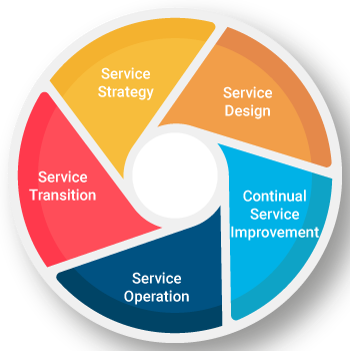
Service lifecycle is an approach to IT Service Management that places an emphasis on how important coordination and control is, across the various functions, processes, and systems that are necessary to manage the complete lifecycle of IT services. The approach of service lifecycle takes into consideration the strategy, design, transition, operation, and continual improvement of IT services. ITIL Service lifecycle modules are of a strategic nature and have concentrated on the implementation of a complete stage of the ITIL Service Lifecycle.
ITIL Service Lifecycle Modules
The 5 Service Lifecycle Modules which are each based on a Service Lifecycle Phase are:
-
ITIL Service Strategy
-
ITIL Service Design
-
ITIL Service Transition
-
ITIL Service Operation
-
ITIL Continual Service Improvement
ITIL Service Strategy
ITIL Service Strategy gives an explanation regarding how IT Services will be utilized to enable IT to achieve the required objectives. It also explains how IT services underpin the overall business strategy.
The main purpose of the ITIL Service Lifecycle’s service strategy stage is to define the perspective, position, plan, and patterns which are needed by a service provider to meet the business objectives of the organization.
The process areas of service strategy include:
-
Financial management of IT service
-
Demand management
-
Business relationship management
-
Strategy management for IT services
Objectives of ITIL Service Strategy
The objectives of the service strategy stage of the ITIL lifecycle involve providing the service provider with the following:
-
A thorough understanding regarding what exactly is strategy
-
An understanding of the organizational capability that is required to deliver the service strategy.
-
A clear definition of the services it provides and the customers who use them.
-
A clear articulation about the creation, funding and delivery of services, the target customers for the service and how each service delivers value.
-
A clear idea regarding which service assets are used for delivering each value and how their performance can be optimized.
Value of ITIL Service Strategy
Some of the benefits typically obtained by the adoption and implementation of service strategy best practice include:
-
An increased ability to understand and express the links between the IT service assets of the service provider, its activities, and the crucial outcomes achieved by its customers as a result of using their services.
-
A flexible and timely ability to adapt its IT services to take preventive action and meet the changing business needs to ensure an increased competitive advantage over time.
-
The service provider is seen as contributing to value and cost by its organization and its customers.
-
A maintained portfolio of qualified services.
-
Improved IT investment usage where the investment in service development is driven mainly by business priorities and a proper Return on Investment (ROI) analysis.
ITIL Intermediate Service Strategy Qualification (SS)
According to the ‘ITIL: The Basics White Paper’, with the ITIL Intermediate Service Strategy certification, you can understand who the IT customers are, and which service offerings are required to meet their demands. You will get to know the IT capabilities and resources needed to develop the service offerings. You will also be able to evaluate whether your organization’s cost of delivery of the IT service is consistent with the value delivered to the customer.
This credential is best suited for you if you are involved in any of these roles:
-
IT Manager
-
Supplier Relationship Manager
-
IT Finance Manager
ITIL Service Design
Services must be designed with the business objective in mind for them to be able to provide true value to the business. Service design is the stage in the lifecycle which converts a service strategy into a plan to deliver the objectives of the business.
ITIL Service Design provides guidance to design and develop the services and service management practices. It also provides design principles and methods to convert strategic objectives into portfolios of services and service assets.
Objectives of ITIL Service Design
The objectives of ITIL service design are:
-
To design IT services that are so effective that only minimum improvement will be needed during their entire lifecycle.
-
To embed CSI in all the activities of service design to make sure that the solutions become more effective over time.
-
To keep a lookout for investment opportunities by identifying changing trends.
Value of ITIL Service Design
If a service design is good, it is possible to deliver services that are of high quality and very cost-effective. It is also possible to ensure that the business requirements are being met.
The following benefits are provided by an ITIL service design approach that is standard and consistent:
-
It reduces the total cost of ownership (TCO)
-
It significantly improves the quality, reliability, and performance of service.
-
It makes the implementation of new services or changing existing services easy.
-
It helps to improve IT governance.
-
It increases the effectiveness of service management and IT processes.
-
It improves decision-making capabilities.
ITIL Intermediate Service Design Qualification (SD)
Having an ITIL Intermediate Service Design certification demonstrates that you can effectively design new services or modify existing ones, in order to satisfy customer requirements. You will learn how to manage technology, which is considered an integral part of this module, and processes cost-effectively through the certification training program.
This certification is best suited for you if you are involved in any of the following IT roles or areas:
-
Capacity Manager
-
Availability Manager
-
Business Continuity Manager
-
Service Portfolio Manager
-
Service Level Manager
ITIL Service Transition
The role of ITIL Service Transition is to move services and service changes into operational use. ITIL Service Transition also introduces the service knowledge management system (SKMS) which has the ability to support organizational learning and assist in increasing the effectiveness and efficiency of all stages of the service lifecycle. This provides benefits to people through the knowledge and experience of others, helps to support decision-making, and improves the management of services.
The main purpose of the service transition stage in the service lifecycle is to make sure that the new and modified or retired services meet the expectations of the business as previously agreed upon in the service strategy and service design stage of the ITIL lifecycle.
Objectives of ITIL Service Transition
The primary objectives of ITIL service transition are:
-
To plan and manage the changes in service efficiently and effectively.
-
To manage the risks related to newly introduced, modified, or discontinued services.
-
To deploy the service releases into environments that support them adequately.
-
To set the appropriate expectations on the performance and usage of new or changed services.
-
To make sure that the service changes create the expected value for the business.
-
To provide the necessary knowledge and information about services and service assets.
Value of ITIL Service Transition
The following benefits are provided by effective ITIL service transition.
-
It provides us with a better estimation of the costs involved, the timing of the service, the resources required for implementation and the risks involved.
-
The volume of successful change brought about is higher.
-
It aims to reduce the delays which occur as a result of unexpected clashes and dependencies.
-
It results in a reduction of effort which is involved in managing test and pilot environments.
-
It improves the expectation for all the stakeholders.
-
It ensures that the services which have been newly introduced or modified are easy to maintain and cost-effective in the long run.
-
It also offers improved control of the different service assets and configurations.
ITIL Intermediate Service Transition Qualification(ST)
The ITIL Intermediate Service Transition certification demonstrates that you have acquired sufficient knowledge to build, test, and move the design into production in order to deliver the desired value to the customer. It also displays your ability to manage the change and ensure that all users and support personnel are prepared for the production release.
This certification is ideal for you if you are involved in any of these IT roles, or other related ones:
-
Configuration Manager
-
Change Manager
ITIL Service Operation
IT service operation consists of periodic activities, infrastructure, and processes that deliver value to businesses using technology.
Objectives of ITIL Service Operation
The primary objective of IT service operations is to ensure that the required IT services are delivered efficiently and effectively as per the service level agreements to the business users and customers.
Service operations are vital for an organization as meticulously designed and implemented processes will be rendered ineffectual if the operations are ineffectively conducted.
Service Operation also helps to improve the service as periodic activities for performance monitoring, assessment metrics, and data gathering are systematically conducted.
Value of ITIL Service Operation
In the ITIL service lifecycle, each stage adds some value to the business involved. Service Strategy, Service Design, and Service Transition play a major role in providing value to a service, but it is only in the Service Operations stage that the actual value imparted is visible. The values are visible through processes of Service Operation such as Incident Management, Event Management, Problem Management, Access Management, and Request Fulfillment.
Process Under ITIL Service Operation
-
Event Management
It deals with managing an event through its life cycle. It involves detection of events, filtering them, respond to, and logging them to maintain a record.
-
Incident Management
It is concerned with restoring the disrupted services quickly and bringing them back to normal functioning levels to minimize the impact of the disruption on the business.
-
Problem Management
Problem management deals with finding out the root cause of the incidents and taking proactive measures to ensure that such incidents don’t occur in the future.
-
Request Fulfillment
It deals with service requests, which are small and low-risk changes such as the creation of new user IDs, password changes, etc. which are not the core business of a company.
-
Access Management
Access management is concerned with granting access to use a service to only authorized users and preventing unauthorized ones from accessing them.
ITIL Intermediate Service Operation Qualification(SO)
With the ITIL Intermediate Service Operation certification, you will be able to deliver the service on a continual basis and monitor it as well. You will also have the capability to manage disruptions, uncover the root cause of problems, handle end-user requests, detect trends for recurring issues and manage service access.
This certification is suited for you if your work is related to any of the following roles:
-
Release Manager
-
Security Administrator
-
Applications Support
-
IT Operations Manager
-
Database Administrator
-
Problem Manager
-
Service Desk and Incident Manager
-
Network Support
-
Security Manager
ITIL Continual Service Improvement
ITIL Continual Service Improvement is a type of process which utilizes techniques from quality management in order to learn from prior successes and failures and aims to constantly increase the efficiency and effectiveness of IT services and processes.
Objectives of ITIL Continual Service Improvement
Service improvement must primarily focus on maximizing the effectiveness and increasing the efficiency of the IT serves and the IT Service Management processes. The following are the objectives of Continual Service Improvement.
-
Increasing the cost-effectiveness and process efficiency of the IT service.
-
To evaluate, analyze and make recommendations to improve the existing opportunities in each phase of the service lifecycle such as Service Strategy, Service Design, Service Transition, and Service operation.
-
To ascertain and implement activities to increase the quality of the IT service and improve the effectiveness and effectiveness of the IT service management process.
-
To increase the cost-effectiveness of IT service delivery while maintaining the same level of customer satisfaction.
-
To ensure that a standard and relevant method is used for quality management.
Process Under ITIL Continual Service Improvement
-
Service Review
The objective of this process is to review the infrastructure and business services periodically. Service review also aims to improve the quality of service wherever it is necessary and to identify economic ways of providing a service.
-
Process Evaluation
The objective is to evaluate the IT processes on a regular basis. It aims to identify the areas where the process metrics which have been targeted have not been reached, to hold regular audits, benchmarks, assessments, and reviews.
-
Definition of CSI initiatives
The objective of this process is to define the particular initiatives which aim to improve the services and the processes on the basis of results of the service reviews and process evaluations. The initiatives which arise as a result of this are either ones that require customer cooperation or are internal initiatives that are being pursued by the service provider themselves.
-
Monitoring CSI initiatives
The objective of this process is to check the improvement initiatives and verify if they are proceeding as per the plan. If they aren’t, then it aims to implement corrections wherever required.
ITIL Intermediate Continual Service Improvement Qualification(CSI)
The ITIL Intermediate Continual Service Improvement (CSI) certification shows that you have acquired sufficient knowledge in measuring and improving service levels, technology, efficiency, and effectiveness of processes in the overall management of IT services of your organization.
Conclusion
The Service Lifecycle modules are very relevant to those professionals who are looking to pursue the role of a manager or team leader which required management and working across multiple teams. All the Service Lifecycle modules are suitable for those who intend to focus on the processes, practice elements, and management capabilities that are required to provide quality service management practices.
Learn more about Service Management best practices through Invensis Learning’s IT Service Management certification training on ITIL 4 Foundation Course, SIAM Foundation, SIAM professional, VeriSM, etc.
















